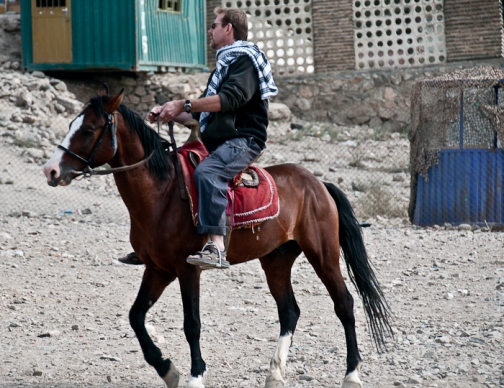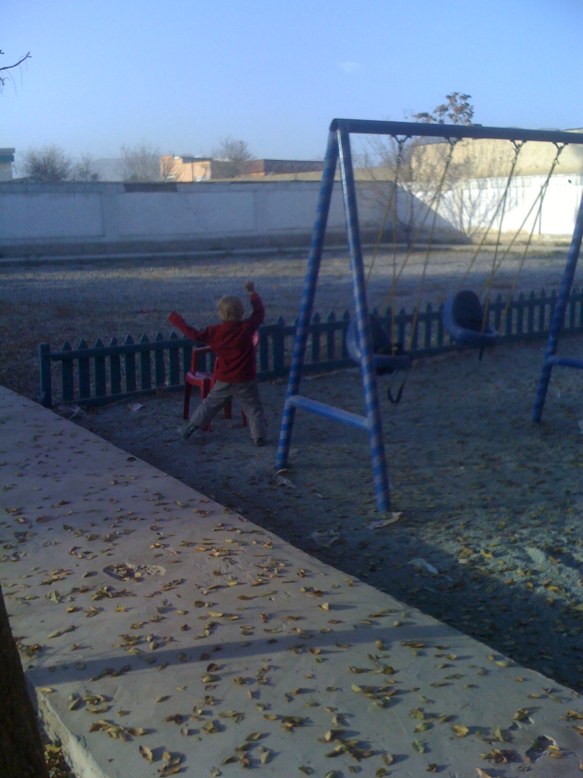I am at Kabul airport. Again. So long I have been coming to this terminal. For years it hardly changed at all: girders hung broken and deadly from the ceiling, huge holes riddled the roof, exposed wires and pipers snaked through the building in an electrician’s nightmare. It was dark and cold and horrifically inefficient. But the people who worked here were fairly friendly. There was a timeless old man who emptied the bins, a foul huddle of steaming toilets and a pirate crew of guards and flight staff and lounging Mujahideen/ Talibs/ policemen. It was a good metaphor for the country as a whole. The guards and officials were resigned, cheerful and nonchalant (the Talibs were always surly). People smoked in the non-smoking areas, spat on the floor, slept slumped over like bags of spilling wheat, and entire families camped out for long periods, days or weeks perhaps, waiting for their flight. You could drive right up to the airport and sometimes right to the place when you were leaving, and when you arrived, you got out of the plane and walked through the building, where an immigration guard might or might not look at your passport. Bags were piled in a big heap out on the tarmac, and you simply collected yours and wandered off.
The last few years, Kabul airport has undergone a transformation. From being a broken, dysfunctional, welcoming place, it has slowly grown into the semblance of a functioning terminal. Walls have been repaired. People no longer spit on the floor. The no-smoking rule is enforced and people who want to suck on a cigarette have to go outside. There are security checks: a raft of them, a stupid, ineffective line of checks that do nothing to promote security, but do a great deal to produce irritation and delay. And the guards and police and officials are gradually becoming officious, arrogant and unhelpful.
I don’t know whether this change is to do with attitudes of policing learned from the foreign forces here: a good cop is a tough, aggressive cop. Or maybe it derives from the huge inequalities that every day here grow greater: those who can exercise power do, because any power people have can perhaps be translated into gain or favour. It might be to do with feeling powerless and once again, eternally poor. Poor and disappointed that the peace dividend of the US invasion of Afghanistan has been so meagre. Problems or issues here used to be mostly resolved with a conversation and a compliment; these days the impartial rule of law does not work, but neither is there a unbiased professionalism. And so little and ever less of the old manners remain, where tolerance, forbearance and a reliance on people to do the right thing were the norm. So we are somewhere in the middle: not the application of law, but not the absence of it. Instead, law is applied gratuitously, randomly, according to whim, mood, ethnicity, bribe, relationship, favour obligation. It is intensely frustrating.
*
At the airport this morning I stood in the queue and watched a woman and her daughter stack up over 140kg of luggage on the check-in scales. The official looked at it, and advised that a excess baggage fee of $120 was payable. The woman summoned a senior looking man in a suit, and whispered a name to him: Shekib. The man nodded, the bags were loaded, the mother and daughter went on their way and no fee was paid. Later, when I checked in, I was asked to produce my foreigners registration card. We all have to have these, and I don’t mind this, it is common enough in Asia. The original rule was, that every time you left Afghanistan, you surrendered the card, and on re-arriving, went and got a new one. That way, the Afghan Government could keep some record of the numbers of foreigners living and operating here (at least I suppose that was the idea). If this rule was systematically applied, I would be quite happy. But it is not: when my parents left Kabul, no card was required at all (just as well, as we hadn’t bothered to get them); when my friend Guen left, he had to surrender his. When we left to go to Kenya, they glanced at our cards, but said we could keep them. Often there is no one to take the cards. Sometimes there is two men, deep in conversation, and they wave you through. This morning, a truculent and stubborn official demanded I surrender mine. ‘ But I am coming back in a week! I am not leaving Afghanistan, this is just a short trip for work! Three weeks ago you let us keep them!’
Predictably starting such a conversation was pointless. And equally predictably, I got angry and he got angry. Then I calmed down and try to placate him, and he told me to go and have a good journey. I asked for my card back, and he again told me to go. Then I got angry, he got angry, and after a few more idiot orbits of this miserable encounter, I gave up and went through the gate fuming, telling the official he was crazy and unhelpful. ‘You’re a dog’ I heard him say, from behind my back, as I walked away.
Not a feel-good moment. But I have lots of not-feel good moments here in the last few years. I think it is because I don’t function well in this limbo of sometimes-law, sometimes not.
Later, after the card incident, I stood in another queue and watched as a large, powerful minister or Government officer and his flock of assistants jumped the queue in front of us all, and simply walked through all the semi-final security unchecked, unharried, unharrassed, and I again felt angry. I find it hard to not let such abuses of power bother me. Partly I am jealous and want such privilege for myself, but largely I loathe the self-serving use of such privilege and despise the way power trumps process.
Elsewhere in Kabul, friends of mine are at the moment dealing with a landlord who is attempting to break a housing contract struck by the landlord’s grandfather. The present landlord is using every dirty trick, including threat, force and bribery to get the lease declared void, and he probably will win. If he doesn’t win in the courts, he can simply throw a hand-grenade over the wall, and my friends will have to vacate the property anyway: two weeks ago, he arrived at the property with two trucks full of armed men, and attempted to seize the building by force. He has resorted to tactics and pressures that we can never use: if we do, we immediately lose any moral authority, and what’s more, we lose the fight as well. You cannot win against such a mindset.
I don’t know. Maybe I should end my time here. I used to love this place and the people. I functioned really well here in the anarchic, desperate, difficult days of the Taliban. Since the fall of the Taliban though, the rest of the world has gotten involved here, and I have found it increasingly hard to love and respect this place and the people. Afghan police now drive like the US military convoys, and have taken, I notice to wearing dark sunglasses. Afghan officials, who were once poor and desperate, but didn’t really stop you from your work, are now essentially out for themselves: two days ago, I was at the Ministry of Women’s Affairs. In partnership with the IOM (a UN entity), we had submitted a proposal to help improve the rehabilitation and care processes of Kabul’s safe houses. There are only a few such shelters here, and the abused, trafficked and beaten women who find their way there are truly in need of real help (e.g., the recent story of a raped girl in Bamiyan who was taken to a cow shed and held down while her brother cut her open with a razor and performed a c-section abortion. No anaesthetic, and she was sewn up with potato sack twine).
Qazi Fouzia, the Deputy for Laws at the Ministry of Women’s Affairs told us that neither Hagar nor the IOM could not work with any Afghan-run shelter, period. She tapped her high heels against the floor, and continued: ‘…the shelters are Afghan’s business; you cannot do this work. You have no protocol. But,’ she said, smiling, ‘we do need new tables, chair and office furnishings here. Actually, we need a new office.’ My eyes rolled in their sockets and involuntarily I found myself shaking my head, but I still smiled back. If she, a woman, has so little heart for the poor women of this country, just what is the point? In the old days, officials would ask for a pen, a book, an English text. Now they want 4WDs and airconditioners to sweeten the deal.
Some people tolerate this kind of stuff much better than me. They have a larger capacity for putting up with other people’s bullshit. The abuse of power, the selfishness, the corruption of laws, the opportunism – it riles them less. I get riled, I get angry. But getting angry here only wins you enemies. A person I know, when he left here for the last time, shook the dust from his feet as he boarded the plane at this same airport. He was recalling the Biblical example, where such an action indicates that a place has rejected light and chosen darkness. That was his opinion; wrong perhaps, but that was how he felt. I don’t want to leave here feeling like that. I want to leave here with my love intact.
Let the world read Phil's wondrous words






